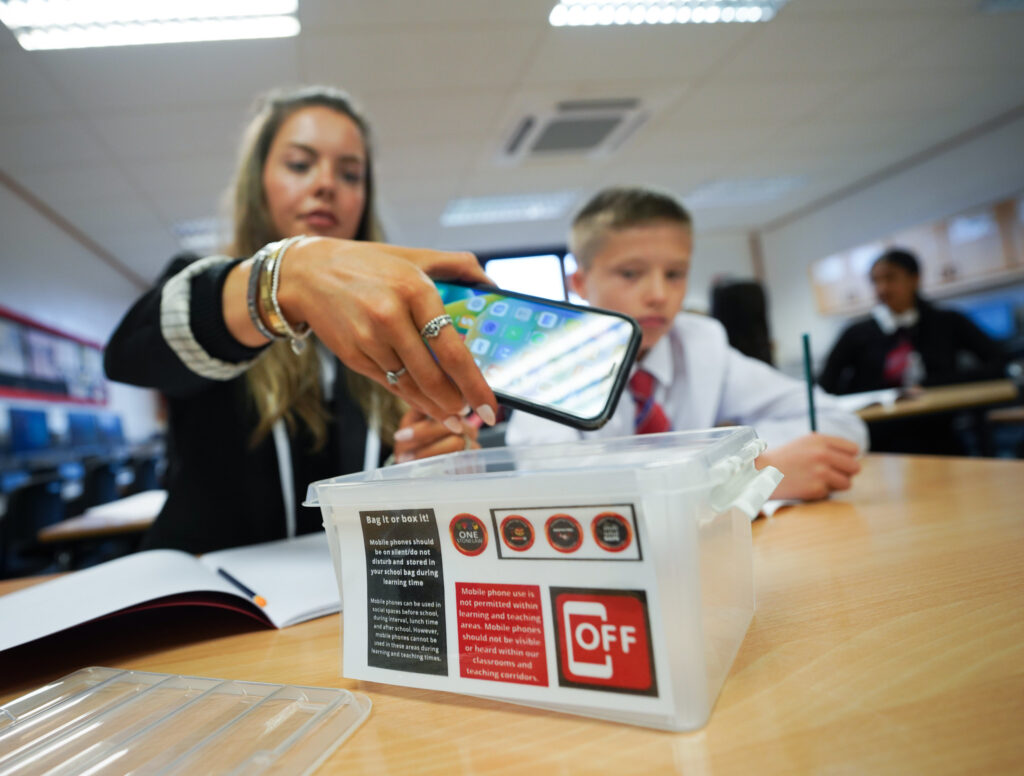
Middle Tennessee school districts are rolling out new cellphone policies to comply with a new state law. While the law gives latitude to local school boards, educators and policy experts insist that restricting cellphone use in schools improves social skills and keeps students safer in the event of an emergency.
Last March, Tennessee lawmakers from both sides of the aisle overwhelmingly passed a bill banning the use of cellphones and other wireless devices during classroom instruction time. It allows exceptions for students with disabilities or other medical needs and those who rely on wireless devices for educational purposes.
The law went into effect on July 1 and allows school districts to determine their own level of cellphone restriction. In recent weeks, school boards have been revisiting their policies and making various updates.
Wilson County will allow students to use their phones in between classes, during lunch and restroom breaks.
Students in Rutherford County will have to part with their cellphones for the entire day. School board members said in a July 21 policy meeting that the phones should be stored away, but teachers don’t have to check if the phone is actually turned off because that would be too time-consuming. Students are allowed, however, to use their phones during special events like pep rallies and homecoming.
Cellphones are already banned during classroom instruction in Metro Schools, so a district spokesperson says there won’t be significant changes in light of the new state law. Still, the school board will consider any revisions at its meeting August 12.
Similarly, Cheatham County Schools already has a cellphone ban in place but will review its policy at an upcoming board meeting.
‘Students are talking to each other‘
One public charter school in Antioch is taking the all-day ban approach to the extreme – by requiring that students put their phones in locking Yondr pouches. The point is to help students build community and improve their social skills, said Emily McDonald, director of college access and success at Independence Academy,
“I just noticed a huge difference in the lunchroom where students are talking to each other,” she told WPLN News. “They’re playing chess. They’re interacting as opposed to walking by a table of silent kids all just watching TikTok.”
Overuse of smartphones hampers teenagers’ social skills, according to Casey Mock, policy director of the Anxious Generation Movement. The group stems from social psychologist Jonathan Haidt’s best-selling book, “The Anxious Generation,” which outlines how smartphones and social media have damaged the mental health of young people.
Mock, a Memphis native who attended the University of Tennessee-Knoxville and Vanderbilt University law school, told WPLN News that neighboring states have more restrictive cellphone bans and encourages Tennessee to adopt a cellphone ban policy that is consistent statewide. He further noted that the addictive nature of smartphones make an all-day ban in schools the best choice.
“If a class is 50 minutes long and you’re getting that phone back in between classes, you’re going to spend the first 10 minutes or so thinking about what you’re missing and the last 10 minutes looking forward to getting your phone back,” he told WPLN News. “That’s 20 minutes out of a 50-minute class that you’re losing that student’s concentration.”
Communication during emergency situations
Some parents expressed concern about how the new cellphone policies will affect their ability to get in touch with their children during emergencies, like lockdowns or school shootings. Among these parents was state Rep. John Ray Clemmons (D-Nashville), who brought up this question during one of the bill’s legislative hearings this spring.
“When there is a lockdown at my child’s school or some other instance of that nature, you’re telling me that if I text my child, he can’t respond or he can’t text me to let me know that he’s okay and in a safe place?” he asked. “Only the school system can do that? Or will I not be able to have that direct communication with my child or he with me?”
Under the final version of the law, students will be allowed to use their phones during emergencies, though it’s unclear how students would quickly access their phones in schools that decide to lock them away most of the day.
The law’s sponsor, state Rep. Rebecca Alexander (R-Jonesborough) said that school districts must iron out the details, but she expects school boards to have a policy of notifying parents directly about emergency situations. She noted that it’s potentially unhelpful for students to call emergency personnel because it can create a backup that prevents other calls from getting through. Advocates of phone-free schools say students should be off their devices and paying attention to resource officers.
The Tennessee Board of Education is charged with reviewing each policy to ensure they comply with the new law. Each district is also required to post any policy to its public-facing website.

